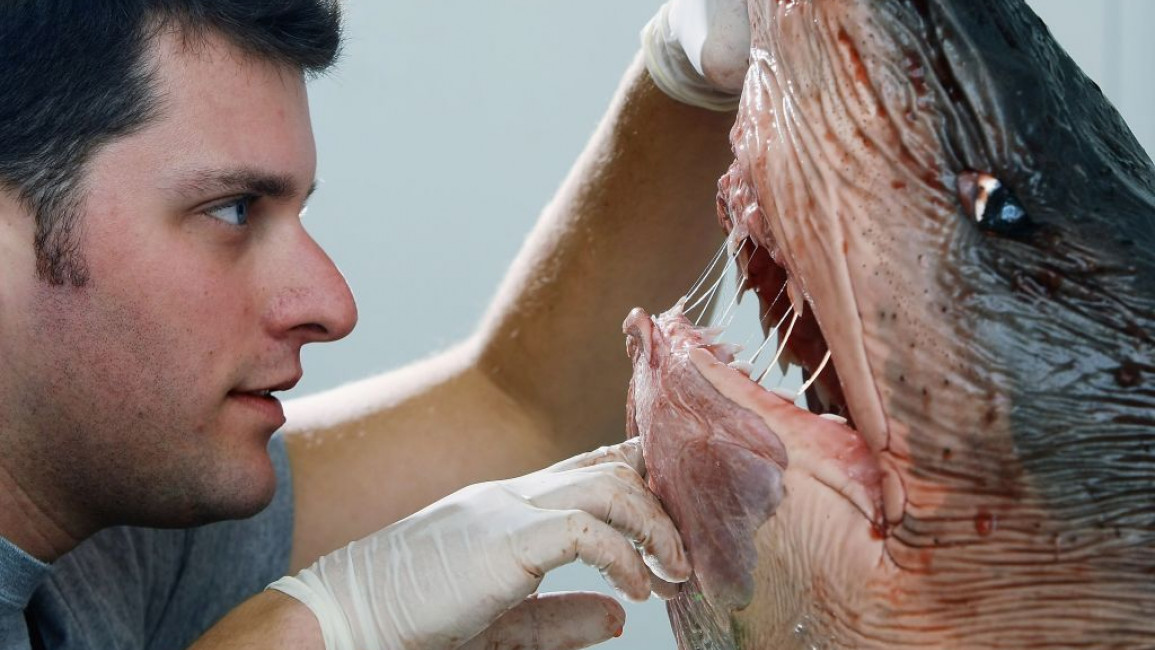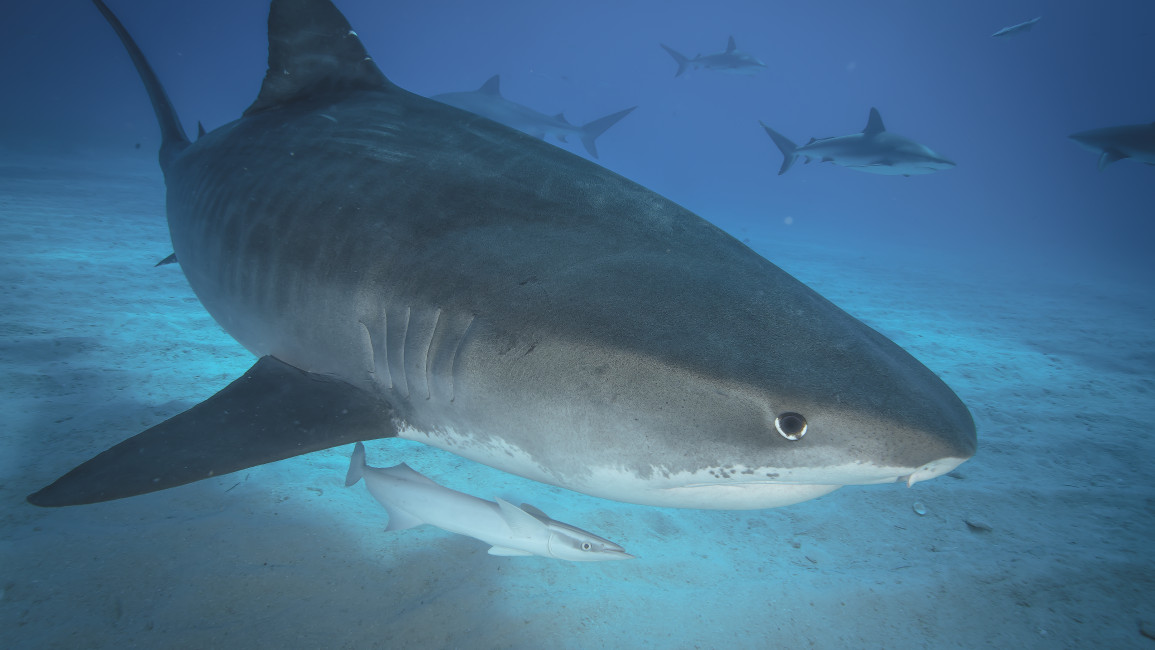Thaer Mansour
Egypt - Cairo
13 June, 2023
Controversy erupts as a rare shark attack in Egypt's Red Sea prompts speculation of a conspiracy targeting tourism

Are sharks deliberately targeting Egyptian tourism? One journalist thinks so
[Getty Images]
A deadly but rare shark attack is causing a media frenzy in Egypt. Some commentators even suggested a 'conspiracy' is behind the spike in such incidents.
A tweet by prominent Egyptian TV journalist Hala Sarhan on last week's attack seemed to suggest there was a plot targeting tourism in Egypt, one of the country’s key sources of national income.
In a now-deleted tweet, she wrote: “I have been thinking…why it [the shark] came to us in the first place? A shark only lives in the deepest, dark depths. How could it move all this distance in water considered shallow to its [natural] environment [?]".
The attack claimed the life of a Russian tourist in the Egyptian Red Sea resort city of Hurghada on 9 June.
"It was said dead sheep were thrown into the water [from a ship] and were followed by the shark. [Let’s] think for a while of who could benefit from this…..It seems the shark has been sent deliberately to afflict…a source of foreign currency that has recently flourished," Sarhan added in the tweet.
The tweet in question, which Sarhan removed shortly afterwards, outraged Saudi social media users who considered it directed against their homeland, which sits across the Red Sea from Egypt.
Sarhan, who currently runs the Saudi Rotana Production Studios at Rotana Media Group, denied the accusations, defending herself in another post and saying she never meant the Gulf country, close to the Egyptian regime of President Abdel-Fattah El-Sisi.
A deadly but rare shark attack is causing a media frenzy in Egypt. Some commentators even suggested a 'conspiracy' is behind the spike in such incidents.
A tweet by prominent Egyptian TV journalist Hala Sarhan on last week's attack seemed to suggest there was a plot targeting tourism in Egypt, one of the country’s key sources of national income.
In a now-deleted tweet, she wrote: “I have been thinking…why it [the shark] came to us in the first place? A shark only lives in the deepest, dark depths. How could it move all this distance in water considered shallow to its [natural] environment [?]".
The attack claimed the life of a Russian tourist in the Egyptian Red Sea resort city of Hurghada on 9 June.
"It was said dead sheep were thrown into the water [from a ship] and were followed by the shark. [Let’s] think for a while of who could benefit from this…..It seems the shark has been sent deliberately to afflict…a source of foreign currency that has recently flourished," Sarhan added in the tweet.
The tweet in question, which Sarhan removed shortly afterwards, outraged Saudi social media users who considered it directed against their homeland, which sits across the Red Sea from Egypt.
Sarhan, who currently runs the Saudi Rotana Production Studios at Rotana Media Group, denied the accusations, defending herself in another post and saying she never meant the Gulf country, close to the Egyptian regime of President Abdel-Fattah El-Sisi.
Once dubbed the “Oprah Winfrey of the Middle East,” Sarhan is not new to controversy. In 2007, she hosted a number of women on her show back then, entitled “Hala Show,” broadcast on Rotana Network, to describe working as sex workers in Egypt while being protected by policemen.
She was later accused of hiring those women as actors to allegedly attract more viewership, which prompted her to flee Egypt to the British capital London. Sarhan returned four years later.
RELATEDEnvironment and ClimateMohamed Ismail
Shark attacks have been relatively rare in Egypt's Red Sea coastal region in recent years. In 2022, a shark attack killed an Austrian woman swimming near the resort of Hurghada. In 2020, a young Ukrainian boy lost an arm and an Egyptian tour guide a leg in a shark attack. In 2010, a spate of shark attacks killed one European tourist and maimed several others off Sharm el-Sheikh on the Sinai Peninsula, across the Red Sea from Hurghada.
Climate change and overdevelopment of the Red Sea coast have been blamed recently for a small spike in shark attacks.
Egypt's Red Sea resorts, including Hurghada and Sharm el-Sheikh, are some of the country's major beach destinations and are popular with European tourists. Divers are drawn by the steep drop-offs of coral reefs just offshore that offer a rich and colourful sea life.
Authorities have in recent years sought to revive the vital tourism sector, battered by years of instability and, more recently, the coronavirus pandemic and the war in Ukraine.
Killer Shark Mummy? Egyptian scientists preserve shark that allegedly killed Russian tourist in Hurghada
The New Arab Staff
London
14 June, 2023
Egyptian scientists are taxidermising the tiger shark blamed for a fatal attack on a Russian at the Red Sea resort of Hurghada.

Tiger sharks are just one of the many species of predatory sharks that swim in the Red Sea's clear waters [Getty]
The tiger shark allegedly responsible for the mauling to death of a Russian man in the Egyptian Red Sea resort of Hurghada will be preserved and displayed in a museum.
Media reports claimed that the killer shark was being "mummified".
Specialists from Egypt’s National Institute of Oceanography and Fisheries (NIOF) decided that the specimen was worthy of display after they conducted an autopsy on the fish.
The tiger shark was female, pregnant and almost 11 feet long, the autopsy revealed. Contrary to initial reports, it is unknown whether the shark contained human remains.
The shark was caught as part of a retaliatory hunt, one that has been criticised by experts. There is no way of establishing whether the shark being taxidermised is the same animal that fatally attacked the Russian tourist – or indeed if the killer shark has even been caught.
Shark attacks in Egypt are on the rise, with experts believing it could be the result of overfishing and the irresponsible expansion of tourists resorts along the Red Sea coast, where shark diving is a hugely profitable endeavour.
In July last year, two women were killed in shark attacks south of Hurghada. In 2020, a shark attacked a 12-year-old Ukrainian boy, who lost an arm and an Egyptian tour guide in Sharm El Sheikh, who lost his leg.
Previously, in 2010, a spate of shark attacks killed one tourist and maimed several others at the same location.
The New Arab reached out to the Egypt's National Institute for Oceanography and Fisheries but received no reply at the time of publication.
The New Arab Staff
London
14 June, 2023
Egyptian scientists are taxidermising the tiger shark blamed for a fatal attack on a Russian at the Red Sea resort of Hurghada.

Tiger sharks are just one of the many species of predatory sharks that swim in the Red Sea's clear waters [Getty]
The tiger shark allegedly responsible for the mauling to death of a Russian man in the Egyptian Red Sea resort of Hurghada will be preserved and displayed in a museum.
Media reports claimed that the killer shark was being "mummified".
Specialists from Egypt’s National Institute of Oceanography and Fisheries (NIOF) decided that the specimen was worthy of display after they conducted an autopsy on the fish.
The tiger shark was female, pregnant and almost 11 feet long, the autopsy revealed. Contrary to initial reports, it is unknown whether the shark contained human remains.
The shark was caught as part of a retaliatory hunt, one that has been criticised by experts. There is no way of establishing whether the shark being taxidermised is the same animal that fatally attacked the Russian tourist – or indeed if the killer shark has even been caught.
The fishermen claim to have caught the shark at the scene of the attack near the Elysees Dream Beach Hotel and dragged it to shore. However, this cannot be verified. One video even showed an Egyptian fisherman punching a dead shark on the deck of a boat.
Footage then emerged of a team of specialists from NIOF preparing the tiger shark for taxidermy, not for mummification initial reports suggested.
The attack has caused concern about the safety of tourists along Egypt’s Red Sea coast, resulting in the temporary closure of a 60km stretch of beaches from El Gouma to Soma Bay.
The highly publicised capture of the shark claimed to be behind the tourist's death has led to the reopening of the beaches and has served to alleviate fears among tourists and locals.
Footage then emerged of a team of specialists from NIOF preparing the tiger shark for taxidermy, not for mummification initial reports suggested.
The attack has caused concern about the safety of tourists along Egypt’s Red Sea coast, resulting in the temporary closure of a 60km stretch of beaches from El Gouma to Soma Bay.
The highly publicised capture of the shark claimed to be behind the tourist's death has led to the reopening of the beaches and has served to alleviate fears among tourists and locals.
RELATEDEnvironment and ClimateMohamed Ismail
Shark attacks in Egypt are on the rise, with experts believing it could be the result of overfishing and the irresponsible expansion of tourists resorts along the Red Sea coast, where shark diving is a hugely profitable endeavour.
In July last year, two women were killed in shark attacks south of Hurghada. In 2020, a shark attacked a 12-year-old Ukrainian boy, who lost an arm and an Egyptian tour guide in Sharm El Sheikh, who lost his leg.
Previously, in 2010, a spate of shark attacks killed one tourist and maimed several others at the same location.
The New Arab reached out to the Egypt's National Institute for Oceanography and Fisheries but received no reply at the time of publication.
No comments:
Post a Comment